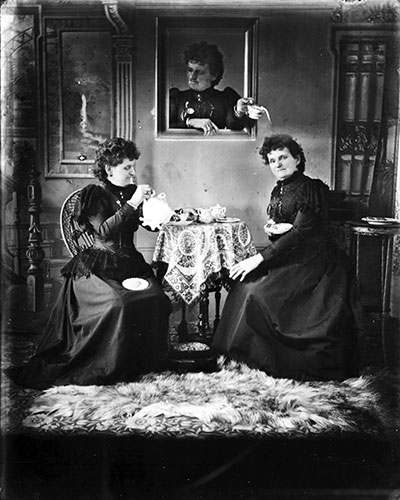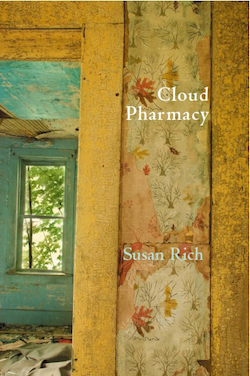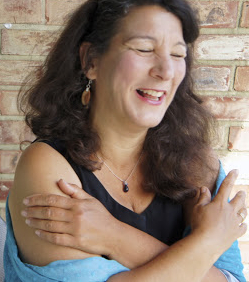In Part and Parcel, I talk with writers and artists about a fascinating facet of their work.
The condition of looking creates longing--or maybe it's the other way around. Art always finds a way to dance between desire and distance. Whether that distance is located in geography or time, art allows an artist to speak to a viewer located in the future.
In her newest book, Cloud Pharmacy (White Pine Press, 2014), poet Susan Rich communicates with painters, photographers, and past selves. What I appreciate most in her work is how keenly aware of her reader she is. Yes, she's talking to a photo, and to the photographer, but she's also speaking to the reader. Wistful, vulnerable, and unapologetic, Cloud Pharmacy's poems prescribe mirrors, light, lust, love. Rich offers back to us "our art/ imperfect and striving."
NOTE: My questions appear in bold. After the mini-interview, you'll find three poems from the book (which appear with the permission of the author) and the author's bio. Images courtesy of the author.
Q: Ferries and ferrymen, bridges, railway tracks, fenced-in yards--your collection of poems, Cloud Pharmacy, is full of boundaries and crossings. I was also struck by how you work with art and seeing in your poems. Sometimes, your speakers are observers of photographs, paintings, and pages; you also speak to the reader from inside the piece of art, inhabiting the images and giving them agency and voice.
When you write, in what ways do you relate to feeling confined or passing through borders? To borrow your phrase, how does art allow us to "travel by window?"
A: Hannah, I'm struck by how much of Cloud Pharmacy's history you've fit into this question. Thank you.
So let's go back to before I was born. All four of my grandparents fled pogroms in Russia and Lithuania, eventually arriving in New York as young adults. In Boston they eventually found jobs in the trades, one grandfather ran a leased corner market.
And so the story goes. Eventually my own life crossed the border from working class rentals into the middle class. At 19, I left for England to study abroad and dropped out of college to travel. Eventually, with the support of student loans, umpteen waitressing jobs, the Peace Corps, the Organization for Security and Cooperation in Europe, Amnesty International and the Fulbright Foundation, I would work in 7 countries from Bosnia Herzegovina to Gaza and the West Bank. Eventually.
Perhaps this is why my poems like to travel. The idea of staying in one country, on one continent is antithetical to my experience. Eventually everything changes. This "e" word covers so many erasures, bus rides, cheap apartments, lost cats, spaghetti dinners, and heartbreaks. Eventually.
These days I've strayed across a different borderland: the land between youth and old age. It's my own Middle Earth. Many of the poems in Cloud Pharmacy deal with this oddity--the humor and humiliation--of middle age. Progressive lenses and sensible shoes. I find myself thinking at least once a day, 'how did this happen'? And so my poems need to keep travelling through time and across space. The Hannah Maynard sequence, "Dark Room" is one example of this. Proto-surrealist Hannah Maynard (1834 -1918) was in her 50's when she lost her teenage daughter Lilly to typhus. Maynard's photographs of the late 1880's include multiple exposure selfies and trick photography. She expresses her fractured identity in a chorus line of Hannahs each holding a single white lily. In another image Maynard creates a make believe tea party with her different selves: the good Hannah, the visionary Hannah, and the trickster Hannah who pours her cup of tea on another Hannah's head.

"Hannah Maynard Self-Portrait," trick photograph, multiple exposure (ca. 1893). Image F-02852, courtesy of the Royal British Columbia Museum, BC Archives, Vancouver, British Columbia, Canada.
So yes my art does "travel in by window." Art--whether we're talking about visual art or poetry amplifies our own range of experiences. And not only the actual objects which drew me to them as remnants of my own thoughts, but the human lives behind them, too. What choices were open to Hannah Maynard, a 19th century woman? Did she recognize her own artistic genius? What happened to Max Liebermann's imagination as he watched the Nazis' slow climb to power? Will any of our art be remembered by those who inhabit the earth after we're gone?
The window into art is the window into our own obsessions, our own pulsing of the blood.
THREE POEMS FROM CLOUD PHARMACY
Dutch Courtyard
~after a painting by Max Liebermann
She labors, but at what she cannot know
for sure. She is alone, but does she know
how she's observed? The outer wall, the window
where girls of ivory and rose watch knowingly
above a makeshift fence; they can't
foresee the story of her winged back, know
nothing of the image-maker's script, the color work -
her supporting bit as laundress, lover, know-
it-all in service to the day's grey socks. Her face
remains defiantly obscured. What can she know
of art? She is arms - green bucket- angled foot -
headscarf - house dress - body of a woman. Knowledge
that she would most likely like to wash away - what good
will it do her? Blue motion of her life elevated to nowhere.
She's judged simple, dirty, ugly - and maybe so.
But see this future person standing here, knowing
all she does of sorrow, bend to palm the frame
stung by something the world cannot express: the notion
of a second soul. She journeys in, traveling by window -
Worker, rich girl, artist in the street: go beyond the known.
Clouds, Begin Here
It is so hard to say what the dead really want.
In the lost fires of the notebook, words stumble
down the columns of green and white paper.
In the notebook of the unknown index, blank
description, we lose our blue hours. Begin with forget
shore line, heart line, forgive me serum.
If we're lucky, the mind sits up straight
in our interior treehouse, our house of sky,
the remodeled one car garage. Open the suitcase
of ink and erasures; let language spill out
in mid-air. Between ferryboat and bicycle,
between daybreak and meteor shower
we create something holy:
apples and crackers and quiet.
Hannah, Decanter, and Cloud
~self portrait at 74
Age is still decanters on the table
the size of small chandeliers
or cloud foam. You, remember,
are the one that is unmade
as of yet, unknown. Medium
merely to an image, a woman
studio-posed. Self-portrait
developed for the afterlife--
our ticker-tape world
of tableaus and combs
circling on. And. Then. Somehow
your barnacled vessel
lit from within like a carriage
clock or sea-washed amber stones.
Have you been taken?
The Victorians inquired; from flesh
into silver salts, into gaslight paper
or gold? Everyone becoming older.
Your gaze darts forward, lifts
beyond the mayor's clapperboard
home, the dead dove, the séance, the bones.
One unknowable instant--
even as the aperture quietly
holds, even as the light
decants over gloved hands
that turn into clouds.
Don't tell me this is only a story.
Tell me there's more to our lives
than jigsaws and doorknobs,
more than tumbleweed, sediment or sex.
We live for the tunnel, the years signatured
together into the surreal, for our art
imperfect and striving.
Susan Rich is the author of four collections of poetry, most recently, Cloud Pharmacy and The Alchemist's Kitchen. She is a co-editor of The Strangest of Theatres: Poets Writing Across Borders and has received awards from The Times Literary Supplement, Peace Corps Writers, and the Fulbright Foundation. Rich's individual poems have appeared in the Antioch Review, Gettysburg Review, New England Review, and Poetry Ireland.

